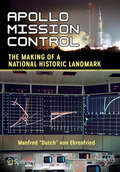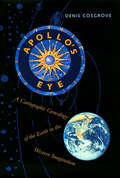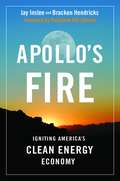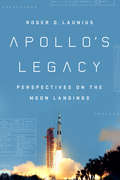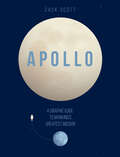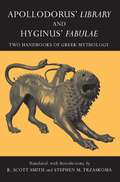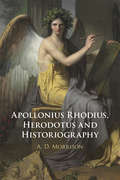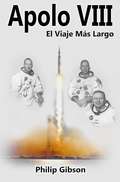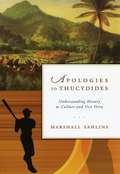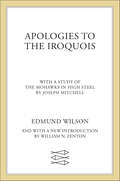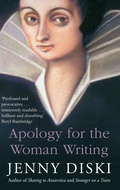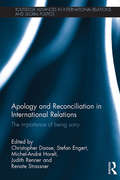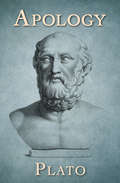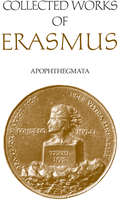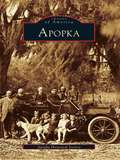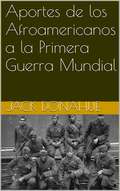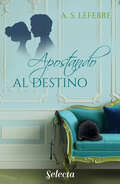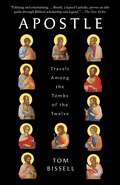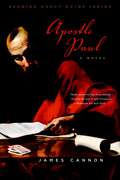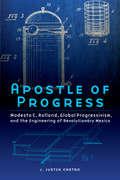- Table View
- List View
Apollo Mission Control: The Making of a National Historic Landmark (Springer Praxis Books)
by Manfred "Dutch" von EhrenfriedThis book describes the history of this now iconic room which represents America’s space program during the Gemini, Apollo, Skylab, Apollo-Soyuz and early Space Shuttle eras. It is now a National Historic Landmark and is being restored to a level which represents the day the flight control teams walked out after the last lunar landing missions. The book is dedicated to the estimated 3,000 men and women who supported the flights and tells the story from their perspective. It describes the rooms of people supporting this control center; those rooms of engineers, analysts and scientists most people never knew about. Some called it a “shrine” and some called it a “cathedral.” Now it will be restored to its former glory and soon thousands will be able to view the place where America flew to the moon.
Apollo in the Age of Aquarius
by Neil M. MaherIn summer 1969, astronauts landed on the moon and hippie hordes descended on Woodstock—two era-defining events that are not entirely coincidental. Neil M. Maher shows how NASA’s celestial aspirations were tethered to terrestrial concerns of the time: the civil rights struggle, the antiwar movement, environmentalism, feminism, and the culture wars.
Apollo's Eye: A Cartographic Genealogy of the Earth in the Western Imagination
by Carmen P. CosgroveWinner of the Association of American Publishers Professional and Scholarly Publishing Award in Geography & Earth Sciences"Earthbound humans are unable to embrace more than a tiny part of the planetary surface. But in their imagination they can grasp the whole of the earth, as a surface or a solid body, to locate it within infinities of space and to communicate and share images of it."—from the Preface Long before we had the ability to photograph the earth from space—to see our planet as it would be seen by the Greek god Apollo—images of the earth as a globe had captured popular imagination. In Apollo's Eye, geographer Denis Cosgrove examines the historical implications for the West of conceiving and representing the earth as a globe: a unified, spherical body. Cosgrove traces how ideas of globalism and globalization have shifted historically in relation to changing images of the earth, from antiquity to the Space Age. He connects the evolving image of a unified globe to politically powerful conceptions of human unity.
Apollo's Eye: A Cartographic Genealogy of the Earth in the Western Imagination
by Denis CosgroveThis award-winning science history explores our evolving image of the globe—and how it has shifted our relationship to the world.Long before we had the ability to photograph the earth from space—to see our planet as it would be seen by the Greek god Apollo—images of the earth as a globe had captured popular imagination. In Apollo’s Eye, geographer Denis Cosgrove examines the historical implications for the West of conceiving and representing the earth as a globe: a unified, spherical body. Cosgrove traces how ideas of globalism and globalization have shifted historically in relation to changing images of the earth, from antiquity to the Space Age. He connects the evolving image of a unified globe to politically powerful conceptions of human unity.Winner of the Association of American Publishers Professional and Scholarly Publishing Award in Geography & Earth Sciences
Apollo's Fire: Igniting America's Clean Energy Economy
by Bracken Hendricks Jay InsleeIn 1961, President John F. Kennedy ignited America's Apollo Project and sparked a revolution in space exploration. Today the New Apollo Energy Project is poised to revolutionize the production of energy and thereby save our planet. The nation that built the world's most powerful rockets, its most advanced computers, and its most sophisticated life support systems is ready to create the world's most powerful solar energy systems, its most advanced wind energy turbines, and its most sophisticated hybrid cars. This will result in nothing less than a second American Revolution. Who are the dreamers in California who believe they can use mirrors and liquid metal to wring more electricity from a ray of sunshine than anyone else on earth can? Who are the innovators who have built a contraption that can turn the energy of a simple wave off the Oregon coast into burnt toast in Idaho? Who are the scientists in Massachusetts who have invented a battery that now runs your hand drill and will soon run your car? Readers will meet them all in this book. They will learn how the new energy economy will grow, the research that is required, and the legislation that must be passed to make the vision a reality. This is a thoughtful, optimistic book, based on sound facts. No one before has tied together the concepts of economic growth and greenhouse gas reductions with such concrete examples. No one has previously told the real stories of the people who are right now on the front lines of the energy revolution. The co-authors, one a U.S. Congressman who is the primary sponsor of the New Apollo Energy Act, and the other the founder of the Apollo Alliance, have joined their experience, expertise, and passion for a clean energy future to lay out the path to stop global warming and gain energy independence.
Apollo's Legacy: Perspectives on the Moon Landings
by Roger D. LauniusAn all-encompassing look at the history and enduring impact of the Apollo space programIn Apollo's Legacy, space historian Roger D. Launius explores the many-faceted stories told about the meaning of the Apollo program and how it forever altered American society. The Apollo missions marked the first time human beings left Earth's orbit and visited another world, and thus they loom large in our collective memory. Many have detailed the exciting events of the Apollo program, but Launius offers unique insight into its legacy as seen through multiple perspectives. He surveys a wide range of viewpoints and narratives, both positive and negative, surrounding the program. These include the argument that Apollo epitomizes American technological--and political--progress; technological and scientific advances garnered from the program; critiques from both sides of the political spectrum about the program's expenses; and even conspiracy theories and denials of the program's very existence. Throughout the book, Launius weaves in stories from important moments in Apollo's history to draw readers into his analysis. Apollo's Legacy is a must-read for space buffs interested in new angles on a beloved cultural moment and those seeking a historic perspective on the Apollo program.
Apollo: A Graphic Guide to Mankind's Greatest Mission
by Zack ScottIllustrations, infographics, and little-known facts about NASA’s Apollo program and the 1969 moon landing.July 20, 1969, marked one of the greatest achievements of mankind—the moon landing. In his infographic-packed book, Apollo: A Graphic Guide to Mankind’s Greatest Mission, Zack Scott recounts the entire journey of the Apollo space program. Unlike previous books on this topic, Apollo illustrates the tiniest details of how man came to walk on the moon, paying particular attention to many of the lesser-known facts about the mission. Artful infographics throughout focus on a wide range of details for space-lovers to obsess over—astronaut weights, mission insignia and spacecraft call signs, fuel consumption stats, splashdown sites around the world, and much, much more. A fresh, lively approach to the subject, Apollo is the perfect combination of science, design, math, and space.
Apollodorus' Library and Hyginus' Fabulae: Two Handbooks of Greek Mythology
by R. Scott Smith Stephen M. TrzaskomaBy offering, for the first time in a single edition, complete English translations of Apollodorus' Library and Hyginus' Fabulae--the two most important surviving "handbooks" of classical mythography--this volume enables readers to compare the two's versions of the most important Greek and Roman myths. A General Introduction sets the Library and Fabulae into the wider context of ancient mythography; introductions to each text discuss in greater detail issues of authorship, aim, and influence. A general index, an index of people and geographic locations, and an index of authors and works cited by the mythographers are also included.
Apollonius Rhodius, Herodotus and Historiography
by A. D. MorrisonThis book examines the Argonautica of Apollonius of Rhodes through one aspect of its relationship with other texts. The particular intertextual relationship examined is that with the Histories of Herodotus, focusing on the presence of the latter text in the former in terms of the poem's employment of characteristics and features of historiographical discourse, narrative structures, presentation and description of characters, aetiology and patterns of explanation, portrayal of ethnic groups, depiction of kingship and tyranny; the relationship between particular passages in both texts is also explored. The consequences for the interpretation of the poem are profound: the Argonautica employs Herodotean historiography as a key intertext in order to manipulate and frustrate the reader's generic expectations for an epic poem and to complicate the relationship between the contemporary Hellenistic Mediterranean (and its kingdoms) and the distant mythological Argonautic past.
Apolo VIII - El viaje más largo
by Philip Gibson Federico Renzi¿Qué hubiera pasado si hubieran existido medios de comunicaciones sociales durante la misión del Apolo 8 a la Luna en el 1968? Esta misión sería el viaje más largo y más peligroso jamás intentado por el hombre. Este relato regresará a todos ustedes atrás en el tiempo pero de una forma creíble directamente dentro de esos seis días tensos y dramáticos del 1968. Es la historia de la primera misión tripulada hacía la Luna relatada en una forma moderna con el sistema de los medios de comunicación sociales de hoy en día, permitiéndonos ser testigos de los dramas de la misión, como si la estuviéramos siguiendo en tiempo real y como si los participantes y observadores estuvieran compartiendo sus pensamientos y acciones con nosotros directamente. En diciembre de 1968, quedaba mucho por conocer. Sería el primer lanzamiento tripulado utilizando el gigantesco cohete Saturno V y si todo iba a salir bien ese mismo cohete los regresaría a la órbita de la Tierra. ¿Serían los seres humanos capaces de sobrevivir atravesando los cinturones de radiación de Van Allen presente entre la Tierra y Luna? ¿Qué pasaría a los astronautas en el momento de pasar alrededor de la cara oculta de la a la luna fuera del contacto con la Tierra? ¿Podrá el único motor lograr impulsar la nave espacial fuera de la órbita lunar en un viaje de regreso hacía la Tierra como todos se esperan? ¿Tendrá éxito la primera recuperación nocturna de una nave espacial en el océano Pacífico? Si la misión Apolo 8 tendrá éxito, las astronautas a bordo se convertirían en los primeros seres humanos a viajar tan lejos y tan increíblemente, increíblemente rápido. Serían los primeros en salir de la esfera de influencia de la Tierra y los primeros en ver todo el planeta Tierra desde el espacio. Ellos serían los primeros en orbitar alrededor de la Luna, los primeros en poner los ojos en la cara oculta de la Luna y los primeros seres humanos a presenciar la esp
Apologies to Thucydides: Understanding History As Culture and Vice Versa
by Marshall SahlinsThucydides' classic work on the history of the Peloponnesian War is the root of Western conceptions of history--including the idea that Western history is the foundation of everyone else's. Here, Marshall Sahlins takes on Thucydides and the conceptions of history he wrought with a groundbreaking new book that shows what a difference an anthropological concept of culture can make to the writing of history. Sahlins begins by confronting Thucydides' account of the Peloponnesian War with an analogous "Polynesian War," the fight for the domination of the Fiji Islands (1843-55) between a great sea power (like Athens) and a great land power (like Sparta). Sahlins draws parallels between the conflicts with an eye to their respective systems of power and sovereignty as well as to Thucydides' alternation between individual (Pericles, Themistocles) and collective (the Athenians, the Spartans) actors in the making of history. Characteristic of most histories ever written, this alternation between the agency of "Great Men" and collective entities leads Sahlins to a series of incisive analyses ranging in subject matter from Bobby Thomson's "shot heard round the world" for the 1951 Giants to the history-making of Napoleon and certain divine kings to the brouhaha over Elián Gonzalez. Finally, again departing from Thucydides, Sahlins considers the relationship between cultural order and historical contingency through the recounting of a certain royal assassination that changed the course of Fijian history, a story of fratricide and war worthy of Shakespeare. In this most convincing presentation yet of his influential theory of culture, Sahlins experiments with techniques for mixing rich narrative with cultural explication in the hope of doing justice at once to the actions of persons and the customs of people. And he demonstrates the necessity of taking culture into account in the creation of history--with apologies to Thucydides, who too often did not.
Apologies to the Iroquois
by Edmund WilsonEdmund Wilson at his most lucid and thought-provoking, traveling off his usual literary track to deliver this engrossing account of life among the Iroquois in all its facets.
Apologies to the Iroquois (The\iroquois And Their Neighbors Ser.)
by Edmund WilsonEdmund Wilson's personal and informative study on the plight of the Native American Indians, Apologies to the IroquoisAs Wilson writes, “[In August 1975] I discovered in the New YorkTimes what seemed to me a very queer story. A band of Mohawk Indians, under the leadership of a chief called Standing Arrow, had moved in on some land on Schoharie Creek, a little river that flows into the Mohawk not far from Amsterdam, New York, and established a settlement there. Their claim was that the land they were occupying had been assigned them by the United States in a treaty of 1784. The Times ran a map of the tract which had at that time been recognized by our government as the territory of the Iroquois people, who included the Mohawks, the Senecas, the Onondagas, the Oneidas, the Cayugas and the Tuscaroras, and were known as the Six Nations. The tract was sixty miles wide, and it extended almost from Buffalo to Albany. "I had already known about this agreement as the Treaty of Fort Stanwix (now Rome, New York), which had first made it possible for white people to settle in upper New York State without danger of molestation by its original inhabitants; but I had not known what the terms of this treaty were, and I was surprised to discover that my property, acquired at the end of the eighteenth century by the family from which it had come to me, seemed to lie either inside or just outside the northern boundary. Having thus been brought to realize my ignorance of our local relations with the Indians and continuing to read in the papers of the insistence of Standing Arrow that the Mohawks had some legal right to the land on which they were camping, I paid a visit, in the middle of October, to their village on Schoharie Creek . . . .”
Apology For The Woman Writing
by Jenny DiskiMarie de Gournay was eighteen when she read, and was overwhelmed by, the essays of the French philosopher Montaigne. She had to be revived with hellebore. When she finally met Montaigne, she stabbed herself with a hairpin until the blood ran in order to show her devotion. He made her his adopted daughter for the two months they knew each other. He died four years later, after which, though scorned by intellectuals, she became his editor. Jenny Diski engages with this passionate and confused relationship between 'father and daughter', old writer/young acolyte, possible lovers, using both their voices. Much of their story is about absence of the people they love. In Jenny Diski's hands it becomes a fascinating tale.
Apology For The Woman Writing
by Jenny DiskiMarie de Gournay was eighteen when she read, and was overwhelmed by, the essays of the French philosopher Montaigne. She had to be revived with hellebore. When she finally met Montaigne, she stabbed herself with a hairpin until the blood ran in order to show her devotion. He made her his adopted daughter for the two months they knew each other. He died four years later, after which, though scorned by intellectuals, she became his editor. Jenny Diski engages with this passionate and confused relationship between 'father and daughter', old writer/young acolyte, possible lovers, using both their voices. Much of their story is about absence of the people they love. In Jenny Diski's hands it becomes a fascinating tale.
Apology and Reconciliation in International Relations: The Importance of Being Sorry (Routledge Advances in International Relations and Global Politics)
by Judith Renner Christopher Daase Stefan Engert Michel-André Horelt Renate StrassnerThis book looks into the role and effects of public apologies in international relations. It focuses on two major questions - why and when do states issue apologies for historic crimes and how and under what conditions are these apologies successful in remedying conflictive relationships? In recent years, we have witnessed an unseen popularity of apologies, with numerous politicians, managers and clergymen being eager to apologise and atone for the wrong-doings of their countries or institutions. Public apologies, thus, are a new and highly interesting, while nevertheless still puzzling phenomenon, the precise role and meaning of which in international politics remains to be explored. This book sets out to do exactly this. Focusing in particular on state apologies, it assembles twelve detailed empirical case studies which deal with the two questions raised above. In the first part, the case studies reconstruct the processes in which state representatives react to calls for public atonement, and in the second part the case studies explore the reactions to the apology and evaluate signs for its success or failure. All case studies are based on a theoretical framework which is outlined in the introduction to the book and helps develop tentative assumptions about the emergence and the effects of state apologies, drawing on different strands of literature, such as political science, philosophy, sociology or psychology. This work will be of great interest to students and scholars of conflict reconciliation, international relations and transitional justice.
Apology: Crito And Phaedo Of Socrates - Scholar's Choice Edition
by PlatoSocrates defends himself in court in this resounding speech, recounted firsthand by one of history&’s greatest philosophers. Plato&’s Apology is an account of the speech Socrates makes at the Athenian trial in which he is charged with not accepting the gods recognized by the state, inventing new deities, and corrupting the youth of Athens. Recounted by Plato, Socrates&’s speech is a rousing examination of integrity, wisdom, and the role of a philosopher. It is filled with wit, intelligence, and lessons that remain relevant today.
Apophthegmata
by Elaine Fantham Desiderius Erasmus Betty I. Knott-SharpeAssembled for the young Prince William of Cleves, Erasmus' Apophthegmata consists of thousands of sayings and anecdotes collected from Greek and Latin literature for the moral education of the future ruler. Betty I. Knott and Elaine Fantham's annotated translation of the aphorisms and Erasmus' commentary on them makes this once popular literary and educational text accessible to modern audiences. The introduction discusses the origins of the Apophthegmata, the contents of the collection, and Erasmus' sources.
Apopka
by Apopka Historical SocietyApopka, Florida, started out as a place once dubbed "Big Potato" by the Native Americans of the area and was formerly known as the "Fern City," but it is now most notably considered the "Indoor Foliage Capitol of the World." Once-thriving fragrant citrus groves have been replaced by climate-controlled greenhouses and fields of landscaped nurseries and subdivisions. The second largest city in Orange County, Apopka is located in the northwest region of the county. It functions today as a bedroom community for Orlando and boasts the history of a community filled with a deep sense of pride.
Aportes de los Afroamericanos a la Primera Guerra Mundial
by José Pedro Galindo Macías Jack DonahueEl Gobierno de Estados Unidos experimentó por primera vez en tener soldados afroamericanos en la Primera Guerra Mundial. Estos soldados vieron algo en Francia que nunca vieron antes en los Estados Unidos: La libertad incondicional. Podían caminar por las calles con mujeres blancas sin preocuparse de ser linchados, no tenían que comer en lugares específicos en los restaurantes, beber de ciertas fuentes, o sentarse en la parte trasera del autobús.
Apostando al destino (Apostando al amor #Volumen 3)
by A.S. LefebreLlega la tercera entrega de la serie «Apostando al amor». Un amor verdadero, un pasado triste y una apuesta al destino. Elizabeth Jones, después de la desaparición de su esposo y tras encontrar una carta en donde se entera de que su familia materna la buscó por años y está en Inglaterra, decide embarcarse para buscar su destino, a su familia y a su desaparecido esposo. No solo encuentra amigos que la ayudan, sino unos ojos color esmeralda que se convierten en el amor de su vida. Eduardo Rushmore, quien había decidido no casarse nunca al menos por amor, pues quien creía que había sido el amor de su vida era feliz con su familia, una noche, en un baile de máscaras, conoce a una misteriosa dama de acento extranjero. Jura que es un ángel, y queda perdido en su mirada azul claro. Cuando Eduardo llega a creer que su nuevo título es una maldición porque todos insisten en que debe casarse y por otras situaciones más, se encuentra cara a cara con su ángel, ambos se dan cuenta de que su amor es correspondido. Pero ella guarda un secreto: está casada. ¿Podrán ganar su apuesta al destino para al fin poder estar juntos y llevar a cabo su amor?
Apostando en Navidad: Un romance de Regencia en Navidad
by Sandra SookooDescripción del libro: A veces el amor necesita unas cuantas apuestas para mantenerse, la segunda vez. El placer es su única búsqueda… Colin Rowley, Visconde de Hartsforf, ha recibido una oferta demasiado buena para ser ignorada: si el viene a casa, al Hall Lancaster y a su familia para la mañana de Navidad, él ganará un codiciado caballo de carreras, así como una propiedad. El problema está, en que los recuerdos asociados al castillo ducal de su padre lo atormentan, especialmente aquellos que tienen que ver con la primera chica a la que amó, la que lo rechazó. Enfrentada a unas circunstancias reducidas… La viuda Lucy Ashbrook está dejando Londres por última vez. Ahora que los ahorros de su esposo se han acabado, ella ya no puede mantener su estilo de vida, por lo que después de asistir a la fiesta de Navidad en el Hall Lancaster – el lugar de tantos recuerdos deliciosos- ella volverá a vivir con sus padres, en la propiedad vecina. Demasiado malo es que el primer hombre que se ganó su corazón, y que la acompaña en el viaje a Derbyshire, no ha cambiado en sus maneras egoístas. La magia de la época de fiesta… Cuando una serie de misteriosos eventos continuamente, lanzan a Colin y Lucy juntos, ellos no pueden hacer más, que revivir el pasado, y redescubren el gozo que tuvieron durante aquellos inviernos por tantos años atrás. La felicidad los evade a ambos a menos que ellos, encuentren con lo maravilloso de la época navideña y se entreguen a un amor que ha esperado…con la ayuda de unas pocas apuestas secretas de Navidad, trabajando detrás de bastidores.
Apostle
by Tom BissellA profound and moving journey into the heart of Christianity that explores the mysterious and often paradoxical lives and legacies of the Twelve Apostles--a book both for those of the faith and for others who seek to understand Christianity from the outside in. Peter, Matthew, Thomas, John: Who were these men? What was their relationship to Jesus? Tom Bissell provides rich and surprising answers to these ancient, elusive questions. He examines not just who these men were (and weren't), but also how their identities have taken shape over the course of two millennia. Ultimately, Bissell finds that the story of the apostles is the story of early Christianity: its competing versions of Jesus's ministry, its countless schisms, and its ultimate evolution from an obscure Jewish sect to the global faith we know today in all its forms and permutations. In his quest to understand the underpinnings of the world's largest religion, Bissell embarks on a years-long pilgrimage to the supposed tombs of the Twelve Apostles. He travels from Jerusalem and Rome to Turkey, Greece, Spain, France, India, and Kyrgyzstan, vividly capturing the rich diversity of Christianity's worldwide reach. Along the way, he engages with a host of characters--priests, paupers, a Vatican archaeologist, a Palestinian taxi driver, a Russian monk--posing sharp questions that range from the religious to the philosophical to the political. Written with warmth, empathy, and rare acumen, Apostle is a brilliant synthesis of travel writing, biblical history, and a deep, lifelong relationship with Christianity. The result is an unusual, erudite, and at times hilarious book--a religious, intellectual, and personal adventure fit for believers, scholars, and wanderers alike.From the Hardcover edition.
Apostle Paul: A Novel
by James CannonThe iconic Saint Paul - in his lifetime a scholar, prosecutor for the high court of the Jews, accomplice in murder, adventurer, traveler, orator, writer, advocate, and organizer of a new faith - was in fact a Jewish-Hellenistic citizen of the Roman Empire, a man who by the force of his intellect and indomitable will changed the course of history. Eventually he became the leader of the movement that delivered the social and moral authority of Christianity to a pagan world. Given a message - that man and woman had a purpose in earthly life and a future beyond the grave - he carried it first and unsuccessfully to his fellow Jews, then successfully to the gentiles and all mankind. His quality of mind and ability to exhort and persuade, his personal commitment to ethical conduct and values, and his courage and indefatigability made Paul one of the continuing forces in the progress of Western civilization.Author James Cannon has written about political leaders as a journalist, has served with leaders in public life, and has written feature stories while on the staffs of Time and Newsweek. Now he has taken the story of one of the most momentous quests in history and brought it to life with a vitality and immediacy that is at once gripping, informative, and inspiring.
Apostle of Progress: Modesto C. Rolland, Global Progressivism, and the Engineering of Revolutionary Mexico (The Mexican Experience)
by J. Justin CastroFrom the late nineteenth century to the middle of the twentieth century, Mexico experienced major transformations influenced by a global progressive movement that thrived during the Mexican Revolution and influenced Mexico’s development during subsequent governments. Engineers and other revolutionary technocrats were the system builders who drew up the blueprints, printed newspapers, implemented reforms, and constructed complexity—people who built modern Mexico with an eye on remedying long-standing problems through social, material, and infrastructural development during a period of revolutionary change. In Apostle of Progress J. Justin Castro examines the life of Modesto C. Rolland, a revolutionary propagandist and a prominent figure in the development of Mexico, to gain a better understanding of the role engineers played in creating revolution-era policies and the reconstruction of the Mexican nation. Rolland influenced Mexican land reform, petroleum development, stadium construction, port advancements, radio broadcasting, and experiments in political economy. In the telling of Rolland’s story, Castro offers a captivating account of the Mexican Revolution and the influence of global progressivism on the development of twentieth-century Mexico.
